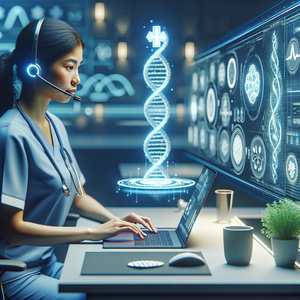The Future of EKG Tech Salaries in a Digital Age

The integration of technology in healthcare has the potential to streamline processes, improve patient outcomes, and redefine job roles. For EKG technicians, the introduction of AI in diagnostics is particularly noteworthy. AI can analyze EKG readings more quickly and accurately than ever before, allowing technicians to focus on more complex cases and patient interactions. For instance, a study published in the Journal of Cardiovascular Technology found that EKG technicians who are familiar with AI-assisted tools are more likely to be offered higher salaries. This suggests that embracing new technologies not only enhances job performance but can also lead to better financial compensation. Moreover, as telemedicine grows, EKG technicians may be required to operate remote monitoring devices, further diversifying their skill set.
Salary Trends in the Age of Digital Health
According to the U.S. Bureau of Labor Statistics (BLS), the median annual wage for EKG technicians is around $55,000. However, this figure is expected to fluctuate based on several factors influenced by technology. As telemedicine becomes more prevalent, EKG technicians may find themselves working remotely, which could lead to salary variations based on geographical location and the cost of living. Regions with a higher demand for telehealth services, such as urban areas with advanced healthcare facilities, may offer more competitive salaries. For example, EKG technicians in metropolitan areas like New York City or San Francisco may earn significantly more than their counterparts in rural settings due to higher living costs and demand for specialized healthcare services. Additionally, as the complexity of EKG procedures increases with new technologies, technicians with advanced skills may command salaries well above the median range.
Skills in Demand for Future EKG Technicians
As the industry evolves, certain skills will become increasingly essential for EKG technicians. Proficiency in digital health technologies, data analysis, and patient communication will be key. EKG technicians will need to engage with electronic health records (EHR) systems and understand how to interpret data generated by AI systems to provide comprehensive patient care. Furthermore, the ability to adapt to new diagnostic technologies and maintain a strong understanding of cardiovascular health will be critical. Continuous education and professional development will not only enhance job security but also increase earning potential. For instance, certifications in cardiac monitoring or advanced EKG interpretation can set candidates apart in a competitive job market, leading to higher salaries and more advanced career opportunities.
The future of EKG technician salaries is undeniably linked to the ongoing digital transformation in healthcare. As technology continues to reshape the industry, EKG technicians who embrace change, upskill, and adapt to new tools will likely find themselves in a favorable position to command higher salaries and enjoy rewarding careers. While the landscape may be evolving, the core mission of these professionals—providing quality patient care—remains unchanged. By staying informed and proactive about technological advancements, EKG technicians can navigate the future with confidence, ultimately enhancing both their professional satisfaction and financial well-being.
Cardiac Monitor Technician
Hospitals, cardiac care units, and outpatient cardiology clinics
Core Responsibilities
Monitor patients' heart rhythms using telemetry systems and respond to alerts regarding abnormal readings.
Collaborate with healthcare teams to provide real-time data to physicians and nursing staff for timely interventions.
Maintain and troubleshoot monitoring equipment to ensure accuracy and reliability during patient care.
Required Skills
Proficiency in EKG interpretation and understanding of cardiac rhythms.
Strong attention to detail and ability to work under pressure in fast-paced environments.
Familiarity with electronic health records (EHR) and telemetry systems.
Telehealth Coordinator
Telehealth companies, hospitals adopting telemedicine services, and healthcare technology startups
Core Responsibilities
Facilitate remote patient monitoring and consultations via telemedicine platforms, ensuring seamless communication between patients and healthcare providers.
Educate patients on using telehealth technology and addressing any technical issues that may arise.
Analyze patient data collected through telehealth systems to identify trends and improve care strategies.
Required Skills
Strong technical aptitude with telehealth technologies and electronic health record systems.
Excellent communication and interpersonal skills to guide patients through virtual appointments.
Experience in data analysis and patient engagement strategies.
Cardiac Catheterization Technologist
Hospitals, cardiovascular surgery centers, and specialized cardiac clinics
Core Responsibilities
Assist physicians during cardiac catheterization procedures by preparing equipment and managing sterile environments.
Monitor patients' vital signs and EKG readings throughout procedures to ensure safety and effectiveness.
Maintain accurate patient records and assist with post-procedure care and instruction.
Required Skills
In-depth knowledge of cardiac anatomy and physiology, as well as familiarity with interventional cardiology.
Certification in cardiovascular technology or related fields; advanced training in catheterization procedures is beneficial.
Ability to work collaboratively in high-stress situations while providing compassionate patient care.
Clinical Data Analyst (Healthcare)
Hospitals, healthcare consulting firms, and research institutions
Core Responsibilities
Analyze patient data and health records to identify trends, improve patient outcomes, and support clinical decision-making.
Collaborate with healthcare teams to implement data-driven strategies in patient care and operational efficiency.
Prepare reports and presentations for stakeholders, translating complex data into actionable insights.
Required Skills
Strong analytical skills with proficiency in data analysis software (e.g., SQL, R, or Python).
Understanding of healthcare regulations and data privacy laws, such as HIPAA.
Excellent communication skills to convey findings to non-technical healthcare professionals.
Health Informatics Specialist
Health systems, healthcare technology vendors, and government health agencies
Core Responsibilities
Manage healthcare data systems, ensuring the accuracy and integrity of patient information across platforms.
Implement and optimize electronic health record (EHR) systems to enhance usability for healthcare providers.
Conduct training sessions for staff on new technologies and data management practices.
Required Skills
Expertise in health informatics, including familiarity with coding systems and data standards (e.g., ICD-10, CPT).
Problem-solving skills and the ability to adapt to rapidly changing technologies and regulatory requirements.
Strong project management skills with experience in system implementation and user training.


